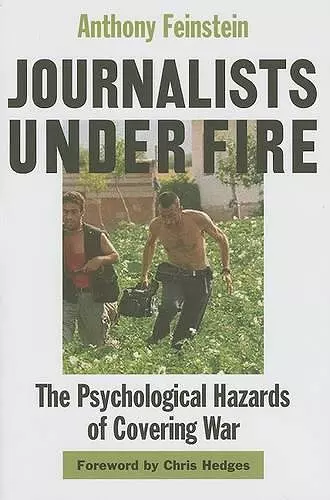Journalists under Fire
The Psychological Hazards of Covering War
Format:Hardback
Publisher:Johns Hopkins University Press
Published:24th Oct '06
Currently unavailable, our supplier has not provided us a restock date

War journalists, like all who have prolonged exposure to violence, come home emotionally maimed and often broken. And yet, a news culture in denial has pretended that war journalists are immune from trauma. This fit into the macho culture of war journalism. It also assuaged the consciences of those running news organizations, who often crumple up and discard, years later, those they send to war. Dr. Feinstein has provided us with research that is a chilling reminder that war journalists are human, as well as a searing indictment of major news conglomerates who have refused to acknowledge or address the suffering of their own. -- Chris Hedges, former New York Times war correspondent and author of War Is a Force that Gives Us Meaning
What emerges are unique insights into lives lived dangerously.As journalists in Iraq and other hot spots around the world continue to face harrowing dangers and personal threats, neuropsychiatrist Anthony Feinstein offers a timely and important exploration into the psychological damage of those who, armed only with pen, tape recorder, or camera, bear witness to horror. Based on a series of recent studies investigating the emotional impact of war on the profession, Journalists under Fire breaks new ground in the study of trauma-related disorders. Feinstein opens with an overview of the life-threatening hazards war reporters face-abductions, mock executions, the deaths of close colleagues-and discusses their psychological consequences: post-traumatic stress disorder, depression, deterioration of personal relationships, and substance abuse. In recounting the experiences of reporters who encounter trauma on the job, Feinstein observes that few adequate support systems are in place for them. He tells the stories of media veterans who have "seen it all," only to find themselves and their employers blindsided by psychological aftershocks. The book explores the biological and psychological factors that motivate journalists to take extraordinary risks. Feinstein looks into the psyches of freelancers who wade into war zones with little or no financial backing; he examines the different stresses encountered by women working in a historically male-dominated profession; and he probes the effects of the September 11 attacks on reporters who thought they had sworn off conflict reporting. His interviews with many of this generation's greatest reporters, photographers, and videographers often reveal extraordinary resilience in the face of adversity. Journalists under Fire is a look behind the public persona of war journalists at a time when the profession faces unprecedented risk. Plucking common threads from disparate stories, Feinstein weaves a narrative that is as fascinating to read as it is sobering to contemplate. What emerges are unique insights into lives lived dangerously.
[A] singular feat. -- Carlin Romano Philadelphia Inquirer 2006 Any college-level collection strong in journalism must have Journalists under Fire. California Bookwatch 2006 Feinstein's eye-opener should be compulsory reading for all news managers, for whom 'dramatic war footage will always prove irresistible.' The Australian Feinstein is a consummate researcher with an insightful and beautifully poetic writing style... As soon as I finished reading this book, I wanted to start all over again. -- Rick Hughes Counselling at Work 2007 Journalists Under Fire is not a textbook of post-traumatic stress disorder or psychological trauma; rather it puts flesh on the bones of the sanitised, sterile descriptions of psychopathology in the academic literature... sometimes disturbing and upsetting but always compelling. -- Martin Deahl British Journal of Psychiatry 2007 Blending fact, interpretation, and fierce poignancy, this first-rate, readable book is a scholarly triumph. Choice 2007 Feinstein captures an intimate view of this tight-knit community and encourages a deeper appreciation for the reality of war journalism-and its accompanying emotional fallout. Journal of Peace Research 2009
ISBN: 9780801884412
Dimensions: 229mm x 152mm x 20mm
Weight: 454g
216 pages